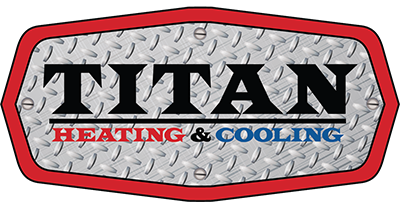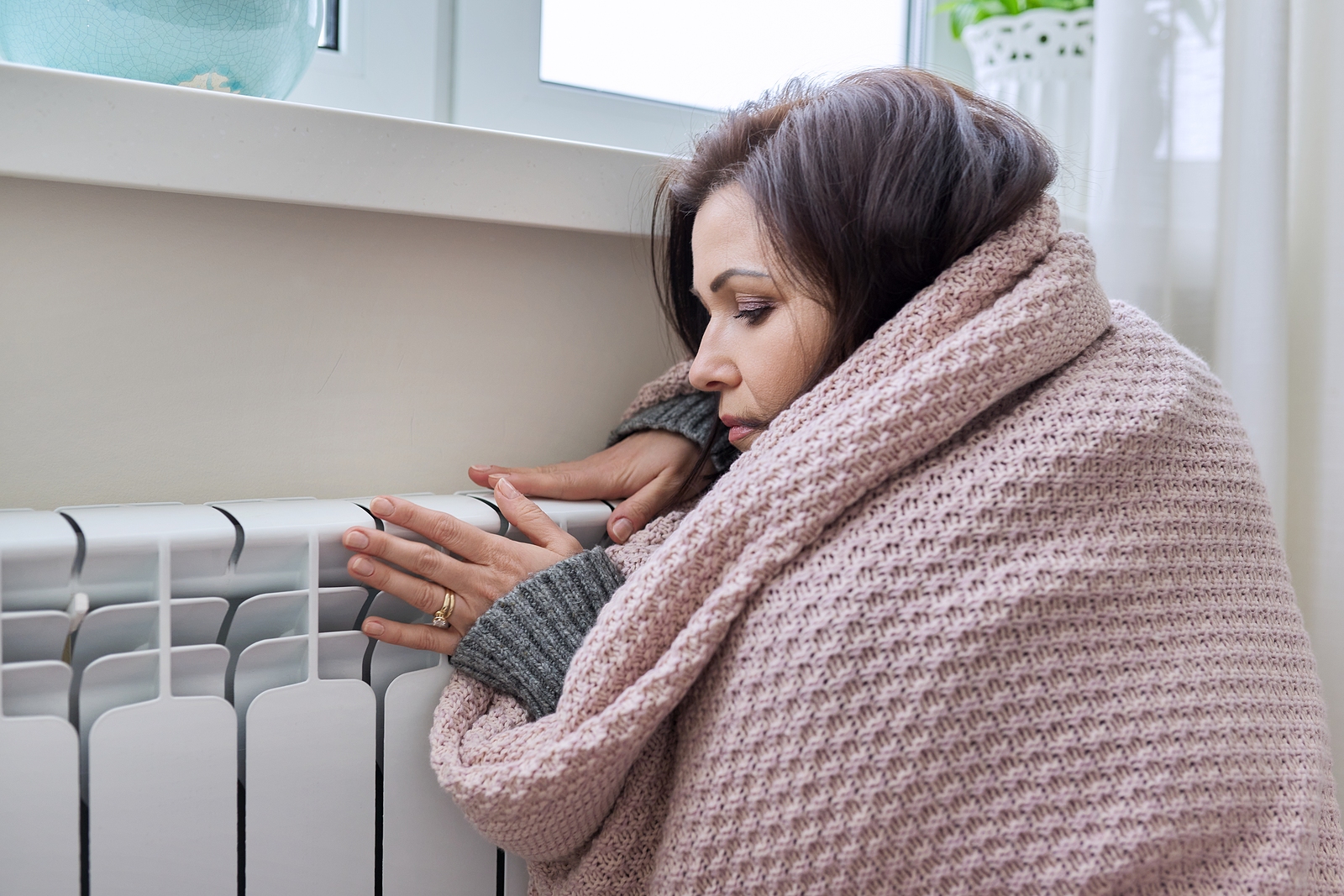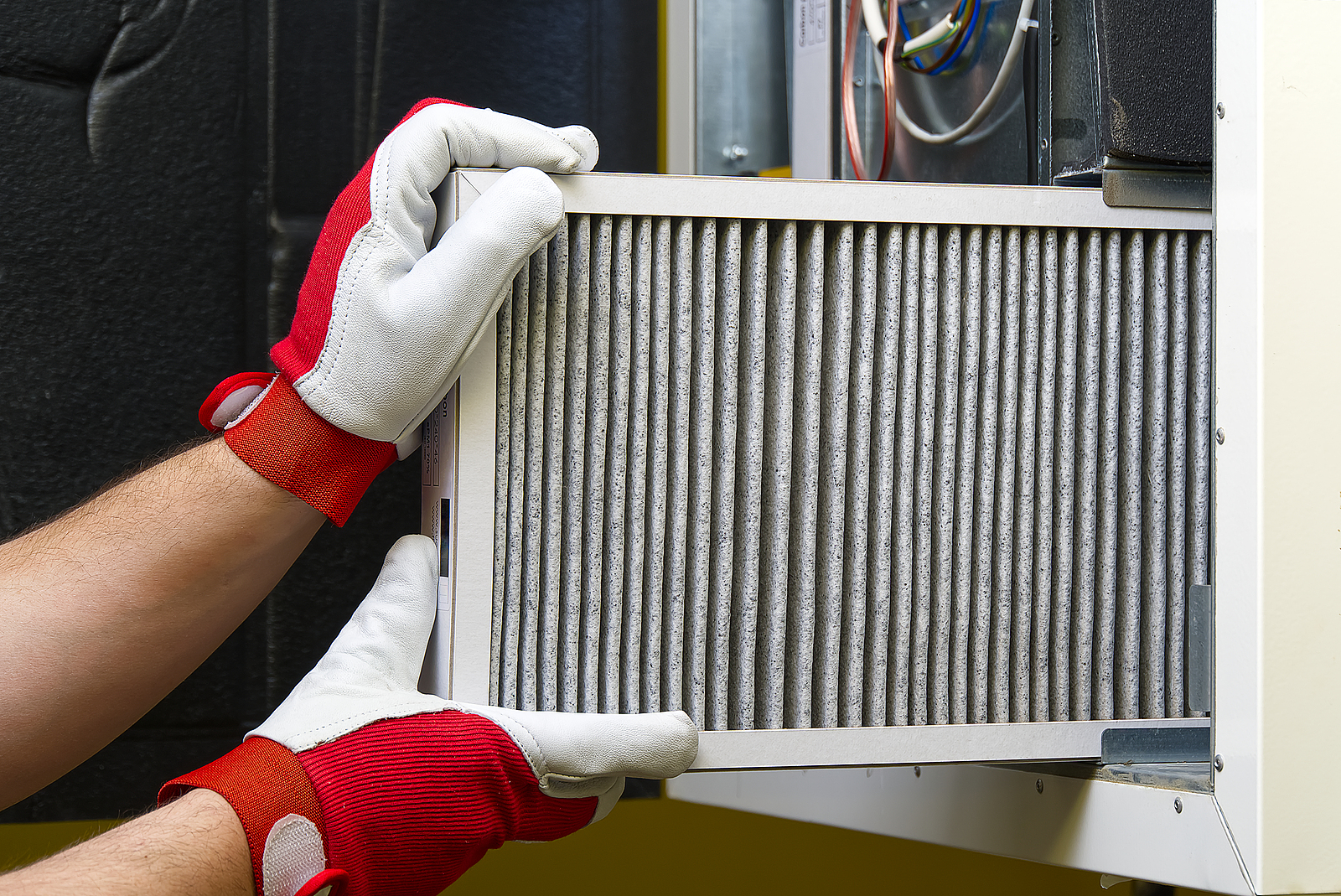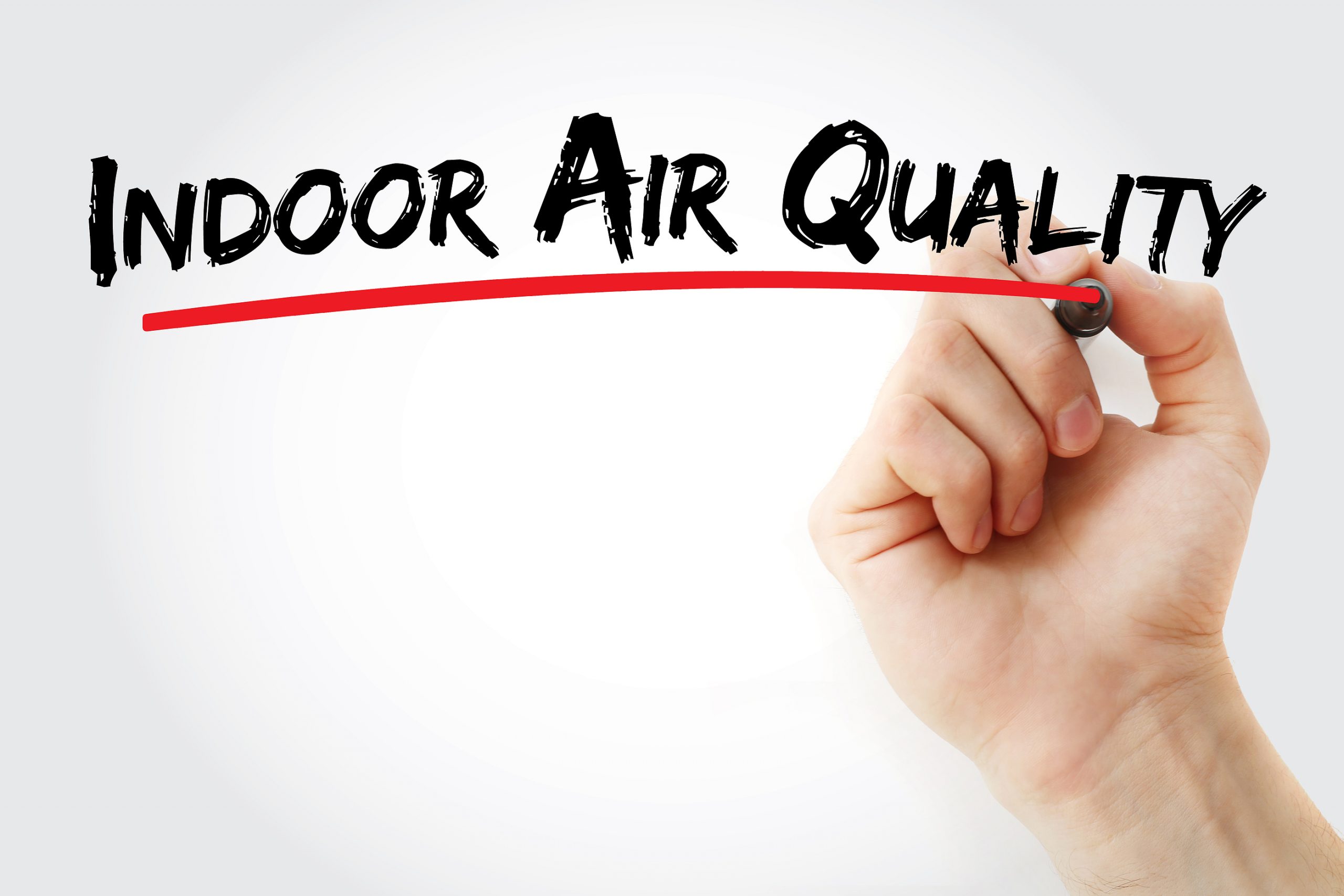Heating season can be tough on your HVAC system. If you don’t keep your heating and cooling system well-maintained, once you switch the heat on for the winter the wear and tear from previous years will quickly make itself known in the form of breakdowns and inefficient heating. Luckily, you can easily get ahead of common winter heating problems with some preventive HVAC maintenance. A little maintenance now can help extend the life of your heating and cooling system and save you money while ensuring a comfortable home all winter long. Make sure your heating system is ready to keep you warm this winter with these maintenance tips. 1. Replace the Air Filter A dirty air filter will make your furnace run harder than it should, driving up your energy bills and potentially damaging your HVAC system. It’s best to start the heating season with a clean filter, then change it regularly. Make sure to check your filter every month. Depending on the type of air filter you have, you may not need to replace it every time, but you should still be in the habit of checking it monthly. 2. Clean the Air Vents When you vacuum your home, make it a habit to vacuum out your air vents as well. This can help prevent blockages and maintain good indoor air quality. If you notice buildup in your vents that vacuuming doesn’t seem to take care of, it may be time to schedule a professional air duct cleaning. At Titan, we recommend cleaning your air ducts at least once every 2-3 years to allow your HVAC system to operate at its highest level of efficiency. 3. Check Your Thermostat Replace your thermostat’s batteries so it is ready to get you through the heating season. (While you’re at it, it’s a good idea to replace the batteries in your smoke and carbon monoxide detectors as well, especially if you haven’t done so in a while). And if you don’t yet have a programmable thermostat, now is the time to upgrade. Additionally, check to ensure your thermostat is programmed to meet your needs this winter. To save energy, set your thermostat to a cooler temperature at night and while you’re at work and a warmer temperature during the times you are home and awake. 4. Have Worn Parts Replaced It’s easier to fix potential problems now than when they become heating emergencies later this winter. To ensure your HVAC system is prepared to run smoothly all season, replace worn parts before they break. Ideally, you should have your heating system inspected each fall, where an HVAC professional will check for signs of wear or malfunction. This way you can have any problem parts replaced before they break or cause damage to other components of your system. 5. Cover Your Outdoor A/C Unit Your A/C unit may not be the first thing on your mind as temperatures get colder, but now is the time to ensure it is protected from damage over the winter. If your HVAC system has an outdoor A/C unit, be sure to cover it for the winter. This will protect it from ice, snow, and debris buildup and help prevent the need for extensive repairs before you turn your A/C on next summer. 6. Add Insulation While insulation may not seem to directly affect the performance of your heating and cooling system, it does play a key role in the overall energy efficiency of your home. If your home is lacking in insulation, your furnace will need to work harder to keep your home warm, and you’ll notice the effects of this in your heating bill. Check to ensure your attic has enough insulation, and add more as...
Read MoreThe filter in your heating and cooling system plays an important role in maintaining good indoor air quality in your home. It works to filter dust, pollen, and other small particles out of the air, creating cleaner, healthier air for you and your family to breathe. It also helps protect your HVAC system by keeping it free of larger particles that could damage it. This is why it is so important to make sure you are using the right type of air filter for your system, budget, and air quality needs, and that you make filter replacement part of your routine HVAC maintenance. There are 7 commonly used types of HVAC filters available for residential heating and cooling systems, but before we get to that, let’s talk a little bit about how those filters are rated. Rating the Different HVAC Filter Options: MERV Rating MERV stands for minimum efficiency reporting value. The MERV rating is a consumer standard developed by the American Society of Heating, Refrigerating, and Air Conditioning Engineers (ASHRAE). MERV measures a filter’s ability to capture particles as small as 0.3 microns to 10 microns. Ratings range from 1 to 20, with the ideal range for most homes between 8 and 13. The higher the MERV rating, the more effective a filter is. However, be aware that MERV ratings at the higher end of the spectrum can make it more difficult for your HVAC system to pull in air, forcing it to work harder (and potentially shortening its lifespan). Fiberglass Air Filters Fiberglass filters are made with strands of fiberglass spun together. They are the most commonly used and least expensive option on the market. They are highly effective at keeping large particles of dirt and debris out of your heating system. However, they are less effective at filtering dust and other small particles out of your air. Because of this, these filters aren’t a good option for those with allergies or respiratory problems. Fiberglass filters typically have a MERV rating of 4. Pleated Air Filters Pleated air filters are made of either polyester or cotton fabric that is folded to create pleats. They are slightly more expensive than fiberglass filters, but are more effective at filtering smaller particles like dust, pollen, mold spores, and pet dander. The increased surface area created by the fabric pleats allow for better filtration: The more pleats a filter has, the better it filters particles out of your home’s air. This type of filter can also help reduce the noise your HVAC fan makes. Pleated filters are available in either disposable or reusable options, and can be recycled as well. MERV ratings of pleated filters can range from 5 to 13. HEPA Filters High-efficiency particulate air filters, or HEPA filters, are the best option for people with allergies and respiratory issues. This type of filter does an excellent job of cleaning your home’s air. In fact, they are effective at screening out up to 99.97% of contaminants, including dust, pollen, mold, pet dander, viruses, bacteria, cigarette smoke, and other irritants. While HEPA filters are a heftier investment up front, they are longer lasting than other air filters, making them more cost effective in the long run. HEPA filters are usually rated 11 or higher on the MERV scale. Washable Air Filters Washable air filters can be cleaned and reused as needed, rather than thrown out and replaced. They cost more initially, but save you money over the long term because you don’t have to replace them. If you use washable filters, it is crucial to maintain them properly. For instance, be sure to let them dry completely before putting them back into your HVAC system, as even a small amount of moisture left...
Read MoreManaging the humidity level in your home is an under-discussed facet of maintaining good indoor air quality. When the humidity in your home is either too high or too low, it can degrade the quality of your air, leading to damage to your home and your belongings as well as negative health effects for you and your family. Humidity control through the use of a humidifier or dehumidifier helps balance your home’s humidity levels for better indoor air quality. Ideal Indoor Humidity Levels Humidity is the amount of water vapor in the air. Relative humidity is the percentage of water vapor in the air at a given temperature compared with the maximum amount of water vapor the air can hold at that temperature. When we talk about indoor humidity levels, we are using a measure of relative humidity. Ideally, humidity levels in your home should be between 35 and 60%. This is the sweet spot for comfort level as well as for healthy indoor air quality. Outside of this range, your home will feel less comfortable and you will begin to notice the effects of poor indoor air quality on your health. How Does Humidity Affect Air Quality? Humidity levels affect how warm or cool your home feels. In the winter, when the air dries out due to drier outdoor air and running your heating system, low humidity can make your home feel colder, even when your thermostat is set at an otherwise comfortable temperature. The higher the moisture content in the air, the warmer your home will feel. Additionally, bacteria and viruses that cause respiratory illnesses thrive in environments with significantly high or low humidity levels. High humidity can also increase the prevalence of mold, dust mites, and other allergens in your home. These things can have a significant impact on your home’s air quality and your family’s health and wellbeing. Health Effects of Low and High Humidity Both extremely low and extremely high indoor humidity can negatively affect your health. Low Humidity When your home’s humidity levels are balanced, moisture in the air weighs down particles of bacteria, viruses, and other pollutants, causing them to fall. But when humidity in your home is low, the drier air allows these particles to move more freely throughout your space. The less moisture there is in the air, the more freely the particles can circulate. Low humidity can cause: Dry skin, rashes, and infectionsChapped lipsItchy eyes and noseDry sinuses and throatDry coughNosebleedsWorsened asthma symptomsand more In addition, dry mucous membranes in the sinuses can make it more difficult for your body to fight off the germs that cause colds, flu, and other respiratory illnesses. Improving your indoor air quality by balancing your home’s humidity levels can help control the spread of infectious diseases. High Humidity On the other end of the spectrum, high indoor humidity can also cause negative health issues, such as: Growth of mold and mildewIncreased prevalence of dust mitesSinus stuffinessDifficulty breathingHeadachesEye irritationSkin irritationAggravated asthma symptoms In addition, high humidity can make warm temperatures feel even warmer, leading to heat-related illnesses like heat rash, heat exhaustion, or even heat stroke. Benefits of Home Humidity Control Luckily, the majority of adverse health effects caused by extreme levels of humidity can be minimized through humidity control. When your home’s humidity levels are kept within the ideal range, you will experience: Healthier skinA more comfortable sleeping environmentReduction in dry, scratchy throat, eyes, and sinusesImproved asthma symptomsReduced risk of airborne illness transmissionAnd many more health and wellness benefits Controlling the humidity in your home is as simple as installing a humidifier or dehumidifier, depending on your needs. At Titan, we install Aprilaire whole-house humidifiers and Ultra-Aire whole-house or free-standing dehumidifiers. Installing a whole-house humidifier or dehumidifier...
Read More




